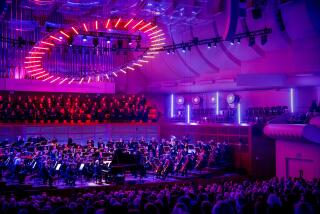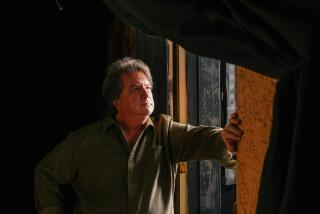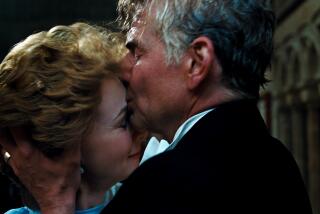A different kind of fugue state by Echo Theater Company
The creation of brilliant music counterpoints the tormented amorous lives of three prominent composers in “Fugue,” Echo Theater Company’s edgy historically based meditation on genius, sexual obsession and betrayal.
Playwright Tommy Smith’s drama is elegantly geometric in its construction and viscerally potent in its staging by Echo artistic director Chris Fields, the creative duo behind last season’s “Firemen.” It follows a similar psychological scorched-earth policy, albeit in a more abstract, cerebral key.
Three ill-fated romantic triangles unfold side-by-side on the minimally appointed crimson-hued Atwater Village Theatre stage, dramatizing real-life scandals from different centuries.
The first involves Arnold Schoenberg (Troy Blendell), his wife, Mathilde (Amanda Street), and the painter (Jesse Fair) with whom she ran away in the early 1900s. The second focuses on Pyotr Tchaikovsky (Christopher Shaw) and the young music student (Alana Dietze) he married in the late 1800s to cover up his homosexual love affair with his nephew (Eric Keitel). The third traces the brutal vengeance exacted by late Italian Renaissance aristocrat Carlo Gesualdo (Karl Herlinger) on his unfaithful wife (Jeanne Syquia) and her lover (Justin Huen).
Each composer’s emotional anguish is inextricably tied to a crowning musical triumph: Schoenberg’s 12-tone system, Tchaikovsky’s “Pathetique” Symphony No. 6, and Gesualdo’s late-career madrigals that anticipated modern chromaticism by three centuries.
The striking innovation here is in transposing the musical principles of fugue into narrative. Parallel elements of the three stories are underscored by impressively choreographed simultaneous delivery of words, phrases and, on occasion, orgasms.
Smith’s dialog is unabashedly anachronistic — the respective time frames are differentiated primarily through Michael Mullen’s period costumes. Unifying these diverse episodes is the demonic, Dionysian force driving the act of creation — a theme with deep intellectual roots that will particularly resonate with readers of Thomas Mann’s “Doctor Faustus,” and Friedrich Nietzsche’s reflections on music and the birth of tragedy.
That the secondary psychiatric definition of “fugue” also figures in disturbing eruptions of erotic violence should come as no surprise — it’s an Echo play. Unadventurous viewers need not apply.
“Fugue,” Atwater Village Theatre, 3269 Casitas Ave., Atwater Village. 8 p.m. Fridays and Saturdays, 7 p.m. Sundays. Ends March 22. $25. (310) 307-3753 or www.echotheatercompany.com. Running time: 2 hours.
More to Read
The biggest entertainment stories
Get our big stories about Hollywood, film, television, music, arts, culture and more right in your inbox as soon as they publish.
You may occasionally receive promotional content from the Los Angeles Times.






